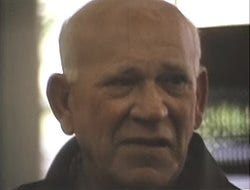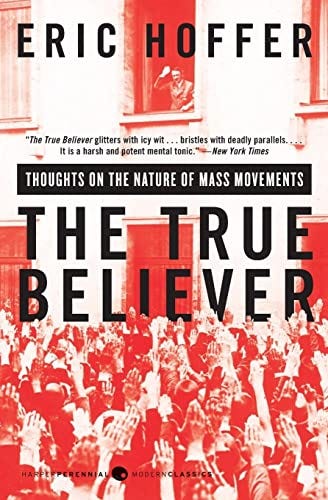Eric Hoffer was not your run of the mill intellectual. He was a working class man, self educated to a level that few PhD’s ever attain, and a person with huge experience in the world. His experience, education and intelligence led to the publication of 10 books, many of them best sellers. He published his first The True Believer in 1951. He first rose to prominence when President Eisenhower mentioned his work during a live press conference.
That Hoffer is less well known today is unfortunate, because, like Abraham Lincoln, he is a uniquely American invention: Both he and Lincoln were self made men from humble beginnings with little formal education, but with admirable intellects and incredible work ethics, who used their talents to add great value to the world, and both had well honed verbal skills.
The True Believer is a fairly short treatment of mass movements, given how complex and bewildering they can seem from the newspaper’s point of view. Hoffer starts by discussing the context of the mass movement, which in his view is a society that devolved to stasis and gave rise to a large cohort of frustrated people.
Where self-advancement cannot, or is not allowed to, serve as a driving force, other sources of enthusiasm have to be found if momentous changes, such as the awakening and renovation of a stagnant society or radical reforms in the character and pattern of life of a community, are to be realized and perpetuated. Religious, revolutionary and rationalist movements are such generating plants of general enthusiasm.
But frustration is not the only required component for the instigation of a mass movement:
For men to plunge headlong into an undertaking of vast change, they must be intensely discontented yet not destitute, and they must have the feeling that by the possession of some potent doctrine, infallible leader or some new technique they have access to a source of irresistible power. They must also have an extravagant conception of the prospects and potentialities of the future. Finally, they must be wholly ignorant of the difficulties involved in their vast undertaking. Experience is a handicap. The men who started the French Revolution were wholly without political experience. The same is true of the Bolsheviks, Nazis and the revolutionaries in Asia.
Hoffer also points to the importance of selfishness throughout this work. He defines selfishness as the person who seeks their self advancement in life, whereas a mass movement requires a different sort:
There is a fundamental difference between the appeal of a mass movement and the appeal of a practical organization. The practical organization offers opportunities for self-advancement, and its appeal is mainly to self-interest. On the other hand, a mass movement, particularly in its active, revivalist phase, appeals not to those intent on bolstering and advancing a cherished self, but to those who crave to be rid of an unwanted self. A mass movement attracts and holds a following not because it can satisfy the desire for self-advancement, but because it can satisfy the passion for self-renunciation.
Instead of selfish men working in the hope of their own betterment, the mass movement attracts a person who no longer holds out hope for his own advancement:
One of the most potent attractions of a mass movement is its offering of a substitute for individual hope. This attraction is particularly effective in a society imbued with the idea of progress. For in the conception of progress, “tomorrow” looms large, and the frustration resulting from having nothing to look forward to is the more poignant. Hermann Rauschning says of pre-Hitlerian Germany that "The feeling of having come to the end of all things was one of the worst troubles we endured after that lost war.” In a modem society people can live without hope only when kept dazed and out of breath by incessant hustling. The despair brought by unemployment comes not only from the threat of destitution, but from the sudden view of a vast nothingness ahead. The unemployed are more likely to follow the peddlers of hope than the handers-out of relief.
But who in particular joins a mass movement? What typifies the mass movement’s adherents? Hoffer takes his time to sort them all out, as they can come from many different places in society; they are not all poor or even in the main poor, but they all share the same need:
A rising mass movement attracts and holds a following not by its doctrine and promises but by the refuge it offers from the anxieties, barrenness and meaninglessness of an individual existence. It cures the poignantly frustrated not by conferring on them an absolute truth or by remedying the difficulties and abuses which made their lives miserable, but by freeing them from their ineffectual selves—and it does this by enfolding and absorbing them into a closely knit and exultant corporate whole.
This is the first half of the book. In the second half Hoffer offers some excellent analysis of how the movement gets off the ground, how it ascends quickly and takes a society by storm, the nature of its leaders; the men of words who start it and the men of action who take it forward.
From beginning to end it’s a fascinating book, the more so because Hoffer was able to write it while also working as a longshoreman in San Francisco during WWII and for twenty years after. It combines a first rate understanding of human social psychology with a courageous spirit of inquiry; nothing was off the table. He eventually found himself at UC Berkely as an adjunct professor. He was awarded the Presidential Medal of Freedom in 1983, the same year he died. He was wise in a way that only happens when intellect and education meet experience:
A man is likely to mind his own business when it is worth minding. When it is not, he takes his mind off his own meaningless affairs by minding other people’s business. This minding of other people’s business expresses itself in gossip, snooping and meddling, and also in feverish interest in communal, national and racial affairs. In running away from ourselves we either fall on our neighbor s shoulder or fly at his throat.
I hope this review might light your curiosity and you take the time to read The True Believer. While I don’t believe there is anything like a mass movement forming in our country, it will occur to you as you read this book that many of its descriptions of the type of person who joins a mass movement sound very relevant:
The reason that the inferior elements of a nation can exert a marked influence on its course is that they are wholly without reverence toward the present. They see their lives and the present as spoiled beyond remedy and they are ready to waste and wreck both; hence their recklessness and their will to chaos and anarchy. They also crave to dissolve their spoiled, meaningless selves in some soul-stirring spectacular communal undertaking; hence their proclivity for united action.
And there is this bit of wisdom about one type always ready to join the latest ‘thing’:
There is perhaps no more reliable indicator of a society’s ripeness for a mass movement than the prevalence of unrelieved boredom. In almost all the descriptions of the periods preceding the rise of mass movements there is reference to vast ennui; and in their earliest stages mass movements are more likely to find sympathizers and support among the bored than among the exploited and oppressed. To a deliberate fomenter of mass upheavals, the report that people are bored stiff should be at least as encouraging as that they are suffering from intolerable economic or political abuses.



interesting!